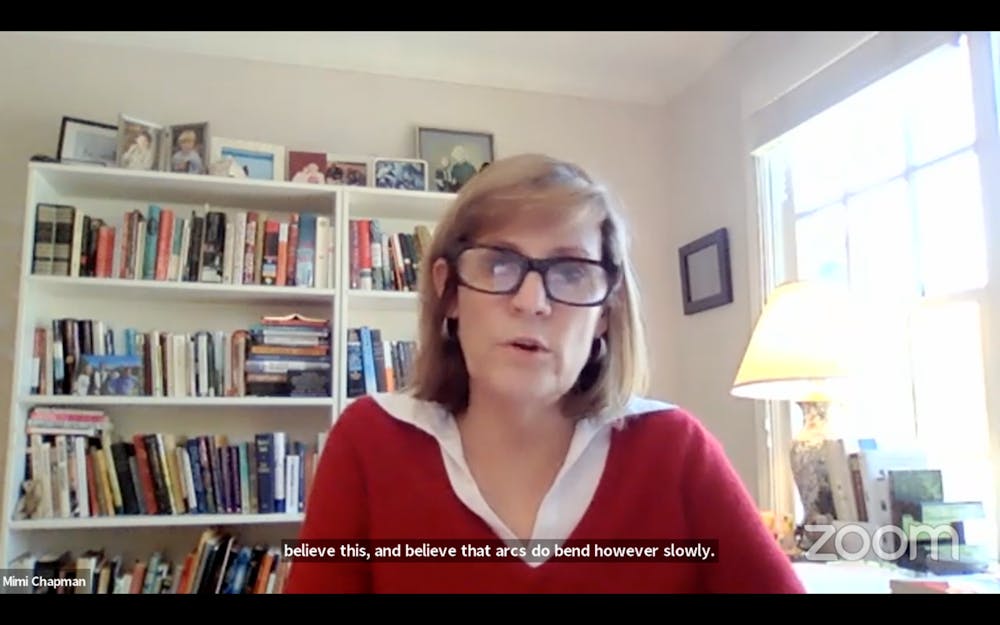Kia Caldwell, a professor in the Department of African, African American and Diaspora Studies, said she would like UNC leadership to recognize that recent racial violence has impacted both students and faculty.
“People can’t be productive when we’re also traumatized and our communities are under assault,” Caldwell said. “It’s not only the COVID-19 pandemic, but the pandemic of violence in our country.”
The council unanimously approved a resolution, put forth by Chapman, “on supporting a safe and inclusive campus.”
The full resolution can be read here.
Diversity and financial aid
Donald Hornstein, chairperson of the Scholarships, Awards and Student Aid Committee, and Rumay Alexander, chairperson of the Committee on Community and Diversity, issued a joint report due to the overlap between financial aid and diversity on campus.
Hornstein said getting rid of need-based financial aid would lead to a decrease in academic excellence — as well as first-generation college students, rural North Carolinians and underrepresented minorities attending the University.
“If you cut need-based financial aid, it is not like we are shooting ourselves in the foot,” Hornstein said. “We are getting rid of some of the meritorious students that we all benefit from.”
Alexander said that in 2019, 41 percent of minority students received and depended on need-based aid. She said she agreed that cutting such assistance would lead to a decline of representation on campus.
“We all know that talent and innovation does not have a gender, race, ethnicity or economic status,” Alexander said. “So, we lose out in terms of what we contribute to the state, the country and to the world.”
Hornstein said recent data has shown that the number of underrepresented minorities on campus who depend on financial aid is increasing. He said future need-based aid will require greater funding — not less — especially due to the disproportionate impact the pandemic has had on African Americans and Hispanics.
“At the beginning of your meeting, you adopted a policy celebrating having an inclusive campus,” Hornstein said. “You will not have an inclusive campus if our financial aid policy effectively excludes. It’ll take far more than just resolutions.”
To get the day's news and headlines in your inbox each morning, sign up for our email newsletters.
New secretary of the faculty
The Faculty Council voted to elect Jill Moore, associate professor of public law and government, as the new secretary of the faculty.
“This is quite historic,” Chapman said. “We’ve never had a woman in this role.”
Suzanne Gulledge, chairperson of the Advisory Committee, announced the nomination of Moore to fill the position. Gulledge said Moore has been a part of the UNC community since 1967 and has shown a strong commitment to upholding equity and inclusion.
Current Secretary of the Faculty Vin Steponaitis said he is personally delighted with the Advisory Committee’s choice and looks forward to working closely with Moore over the coming months. She will take office on July 1.
Other topics of discussion
Caldwell and Erin Malloy, lead principal investigator for TEAM Advance, gave a presentation on the results of a recent faculty mentoring climate survey regarding participation in the program. TEAM Advance is geared toward providing faculty mentors with training related to incorporating intersectionality, gender and racial inequities, Malloy said.
Elizabeth Dickinson and Misha Becker, chairpersons of the Status of Women Committee, shared a presentation addressing gender and racial inequities on campus. Dickinson said UNC faculty that self-identify as men make 20 percent more than those who self-identify as women, with that number increasing to 28 percent with the inclusion of the medical and dental schools.
Becker added that, as opposed to white faculty, faculty of color are also less likely to hold tenure, less likely to hold a full professor rank and have spent fewer years in their current positions.
Two ceremonial resolutions were also mentioned, honoring Shayna Hill, chairperson of the Employee Forum, and Steponaitis.
Friday’s Faculty Council meeting marked the last of the 2020-21 academic year.
university@dailytarheel.com




